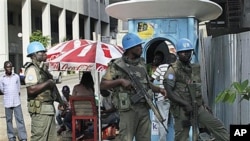A top political figure in Ivory Coast says the world should use force to remove incumbent leader Laurent Gbagbo from power.
Guillaume Soro, a chief ally of Gbagbo's presidential rival, Alassane Ouattara, told French TV network i-Tele on Wednesday that international sanctions are not producing results.
He said force is the only solution left, and called on the United Nations Security Council, the European Union and African countries to consider using it.
Soro previously served as Gbagbo's prime minister, and was appointed to the same post by Ouattara, though the Ouattara government has been unable to take office.
Gbagbo is clinging to power despite intense pressure from the international community, which has recognized Ouattara as the winner of last month's presidential election.
Earlier, the World Bank's president said the bank has halted loans to Ivory Coast. According to its website, the bank had aid commitments of $842 million to the west African country as of January 2010.
Both France and Germany on Wednesday urged their citizens to leave Ivory Coast, after U.N. chief Ban Ki-moon warned the country faces "a real risk" of returning to civil war. Ban on Tuesday said the situation could become critical within days, and accused forces loyal to Gbagbo of trying to block the U.N. mission in Ivory Coast.
Gbagbo insisted Tuesday he is the true president of Ivory Coast, but said he did not want more bloodshed in his country. He said he is willing to allow envoys from the African Union, the European Union and the United Nations to form a panel to study the post-election crisis.
A spokesman for Ouattara has rejected that offer, calling it a game.
Ban said there has been an alarming increase in violence in the past week and said the United Nations has confirmed that mercenaries are being recruited from neighboring countries.
Earlier this week, the United Nations said more than 50 people have been killed. The U.N. mission in Ivory Coast said it has received hundreds of reports of people being abducted from their homes by armed assailants in military uniforms.
The presidential election was meant to restore stability to Ivory Coast, eight years after a civil war split the country into rebel- and government-controlled areas.
Gbagbo has ruled the country since 2000. His term officially ended in 2005, but he remained in office through repeated election delays.
West African leaders plan to hold an emergency summit Friday to discuss the crisis.
Some information for this report was provided by AFP and Reuters.




